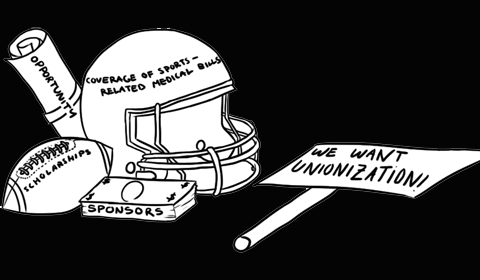
Challenging the amateur status of college athletes, football players at Northwestern University have spearheaded efforts to form a union in order to negotiate for labor rights with the National Collegiate Athletic Association (NCAA), the governing body of college sports. The priorities of the unionization supporters include, among other demands, compensation for medical bills related to concussions, scholarship increases and permission to have commercial sponsors.
The National Labor Relations Board (NLRB) regional office in Chicago ruled in March that Northwestern’s football players qualify as school employees and therefore have the right to unionize. On Apr. 25, team members cast secret ballots regarding whether or not to form a union. The union, which would be led by the College Athletes Players Association (CAPA), would be the first in the country comprised of college athletes.
CAPA co-founder Kain Colter, a Northwestern senior and the former starting quarterback for the school’s team, has guided the movement with the assistance of the United Steelworkers, who helped CAPA contact the NLRB.
“We’re one step closer to a world where college athletes are not stuck with sports-related medical bills, do not lose their scholarships when they are injured, are not subject to unnecessary brain trauma and are given better opportunities to complete their degree,” Colter said in a public statement on the day of the landmark vote, as reported by the Associated Press. He continued to say that he was confident that the vote would support the union.
Sophomore Michael Odom, who left Northwestern’s team after the commitment to the football program interfered with his pursuit of a journalism degree, agreed that a players’ union was “long overdue,” according to ESPN.com.
In spite of Northwestern’s reputation until recent years as a perennial loser in the Big Ten conference, 10th Grade Dean and history and social sciences instructor Tom Millar reasoned that the union movement arose at Northwestern, out of all the Division I colleges, because of the school’s academic rigor.
“It kind of makes sense that it would happen at a place like Northwestern because you’d have people that were world-savvy enough that it would make sense to them. I think even Northwestern players, though, it’s probably hard to be pre-med and be on the football team… [Northwestern’s teams] are more likely to have a higher percentage of true student athletes [than more highly ranked football schools],” Millar said.
He explained that coaches at football powerhouses might encourage players to choose majors that require less work or that do not interfere with with practice schedules.
With a union, players could negotiate for fewer practices or more flexibility with their studies. Colter’s efforts, however, do not have the support of the entire team. Captain Brandon Vitabile has said that he doubts the vote will pass.
“I understand the assumption people make that all student-athletes are mistreated, but the majority of us realize we’re not in that group,” the red-shirt senior center told ESPN. “What me and a lot of our teammates discovered is that the change wouldn’t happen here. It would happen on the broad landscape. So why would we sacrifice all the relationships we have here with the staff and the university that we love—a program and university that, as of a team, all of us have been given everything we were promised?”
The University and the NCAA criticized the March ruling, arguing that the players should remain student tathletes and not attempt to become employees.
“This union-backed attempt to turn studentathletes into employees undermines the purpose of college: an education. Student athletes are not employees, and their participation in college sports is voluntary. We stand for all student-athletes, not just those the unions want to professionalize,” Donald Remy, chief legal officer for the NCAA, said in a press release.
Opponents of the union have also questioned how the NCAA would afford to pay players on unionized teams. Some worry that non-revenue yielding sports, such as men’s wrestling or women’s lacrosse, would lose funding they currently get from the revenue giants, namely men’s football and basketball, in order to support the payments to unionized athletes. Division III colleges, which do not offer scholarships to players, have voiced concern that they could lose their small shares of NCAA revenue, endangering their sports programs.
On the other hand, CAPA has maintained that the NCAA’s yearly media earnings of $1 billion would suffice for payments, preventing the NCAA from drawing from other sources.
While the national NLRB in Washington, D.C. deliberates the school’s appeal to the regional board’s decision, a process that could last for months, the players’ votes will remain impounded and uncounted. Regardless of whether or not Northwestern players ultimately voted for or against organizing, the future of college sports hinges on the NLRB’s verdict. If the NLRB upholds the status of the players as employees, the decision would set the stage for athletes at other private universities to vote on unionization.










